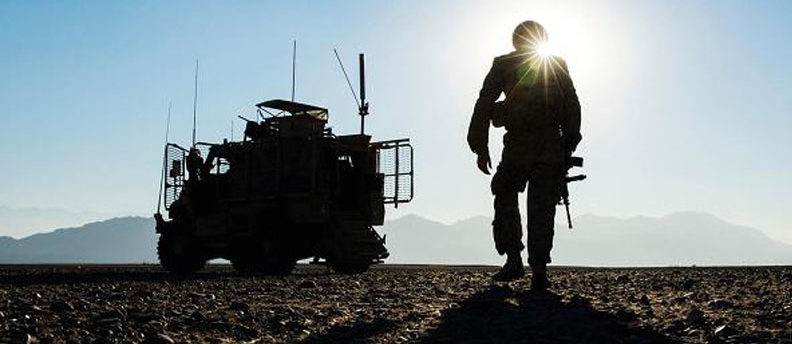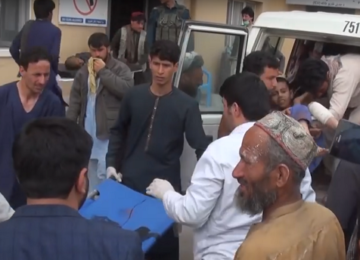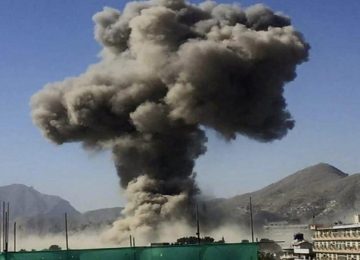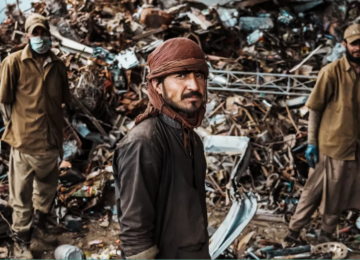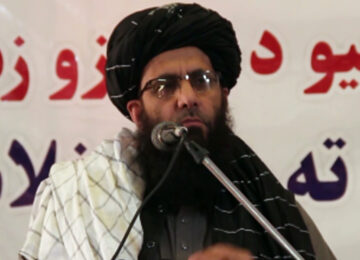The Trump administration plans to beef up its nearly 9000 troops with another 4,000 with the stated objective of training and assisting the Afghan security forces on the way to peace and reconciliation. This addition comes in extremely difficult times, defined by divisions and disagreements within Kabul’s ruling and security circles. President Ghani is lording over a divided house and this is keeping the Taliban also back from engagement for peace.
Additionally, multiple conflicting factors continue to cloud prospects of peace in Afghanistan. And the heart of this unfortunate country’s current political and security crisis sits the new so-called Great Game, driven by big powers’ quest for influence over Afghanistan and the region. The fact that Russia refused to sign off a joint declaration at the end of the Kabul Peace Summit on June also points to this rivalry. Its representative defended the move saying the declaration was being imposed on participants without any prior discussions.
Conflicting regional approach: Although all stakeholders talk of a regional approach, yet a big difference separates the US-Indo-Afghan approach from that of Pakistan, China, Russia, Iran and Turkey; the former, according to the Pakistani officials, want action against non-state actors in the entire region.
The Indo-US-Afghan narrative on the issue includes Lashkare Taiba (LeT) as well as Jaishe Mohammad (JeM) and by implication a multilateral verification plus action mechanism could include even these Pakistan-based outlawed entities. The mechanism could practically serve as the consent for the “kinetic and hot” pursuit into the heartland of Pakistan and thus entail complicating consequences for the government.
The other group of countries looks at it differently; they take President Ashraf Ghani’s talk at the Munich conference early this year on its face value; as many as 20 non-state militia and terrorist groups are currently using the Afghan soil and it requires a collective action, Ghani said. For these countries the regional approach should involve all regional powers to collectively guide and seek a solution to deal with the terrorist and militant groups operating out of Afghanistan.
Sequencing of action against irreconcilable Taliban.
The US-led alliance continuously focuses on military action against the Afghan Taliban reportedly based in Pakistan i.e. Quetta Shura and the Haqqani Network – stating this as the biggest obstruction in the way of peace in Afghanistan. These countries generally sound appreciated of Pakistan’s counter-terror campaign, namely Operation Zarb-e- Azb and its successor Operation Radd-ul-Fasaad, yet their unflinching demand remains a crackdown against the Taliban “safe havens” in Pakistan. The latter, however, believes an all-out action against all Afghan Taliban hiding on its soil, would offset the gains against non-state actors such as TTP and Daesh. Any head-on collision with the Afghan Taliban – who have business, social and political links in Pakistan – could inevitably escalate conflict here. No country would want to squander gains from one war by waging another one in a politically loaded environment.
Intelligence sharing: For Pakistan, any counter-terror collaboration would have to start with an agreement on intelligence sharing. That constitutes the foundation for such undertaking, which sections within the Afghan security establishment fiercely oppose for political reasons, officials begrudge. This represents a potential impediment to discussions on a verification mechanism that can be used to target non-state actors on either side of the border.
Verification mechanism: Pakistan is reluctant in agreeing to a multilateral verification presently being pushed by the Afghan-Indo-American coalition for several reasons; such a move could theoretically provide the US forces with a carte blanche for action on ground as and when they deemed necessary, the way the CIA has conducted the drone campaign since the January 2007 tacit verbal understanding with the Pakistani security establishment.
Secondly, frequent arbitrary military action could draw fierce reaction from all anti-state non-state actors, particularly from those religio-political parties which are ideologically aligned with the Afghan Taliban.
Thirdly, a trilateral verification mechanism will potentially serve as a clutch which the others could use to squeeze Pakistan at will, disregarding the ground socio-political complications that weigh heavily on decision-making in Pakistan.
Fourth, allowing a willful multilateral verification of suspect targets – places and people – runs contrary to the concept of national political and territorial sovereignty. It also carries the risk of diluting Pakistan’s firm position on the border with Afghanistan; civil and military officials insist that – regardless of what Afghan leaders say – the line dividing both countries is the internationally recognized border and they will keep reinforcing it as deemed fit as part of counter-terrorism campaign.
No country allows outsiders to run around freely. For us the geographical boundaries of Pakistan are neither soft nor disputed and we therefore cannot allow its breach under a verification mechanism as demanded by outsiders, official argue. This also explains why Pakistan is forging ahead with border reinforcements such fencing, trenching and monitoring posts on its own territory.
Pakistan, one assumes, prefers a bilateral and actionable verification mechanism. But the primary pre-requisite for that is intelligence sharing, followed by charting of modalities for action on ground. How can we blindly follow leads by the Afghans, without first agreeing ona standard operating procedures (SOPs), officials quip.
We are ready to go after suspects on the Afghan pointation but that requires mutually agreed SOPs first, officials at the ministry of foreign affairs and the General Headquarters (GHQ) maintain.
Way forward: These conflicting approaches also pitch the Quadrilateral Coordination Group (QCG), the Moscow Initiative, and the Heart of Asia process against each other. The latest Kabul Peace summit seems to have scuttled the Russian peace move because the Kabul summit has been projected as the umbrella for the rest of the processes. All these developments are rooted in the geo-political maneuvers and thus hardly point to any light at the end of the tunnel.
Although possible revival of the QCG could be an amenable way forward for all stakeholders to nudge immediate stakeholders into cooperation, yet a deeper discussion requires taking other regional players on board too. Also, one way out of the reported stalemate on the proposed multi-lateral verification mechanism could perhaps be the inclusion of China, Russia and Iran beside Pakistan, Afghanistan and the United States.
So if the bilateral framework does not yield results, a regional framework comprising all the aforementioned countries could replace it. But this is a daunting mission in view of the multilateral mistrust and conflicting approaches on the management of the Afghan crisis.
The author Imtiaz Gul is the Executive Director of the Center for Research and Security Studies (CRSS), Islamabad. This article originally appeared in Daily Times on June 19, 2017. Original link.



